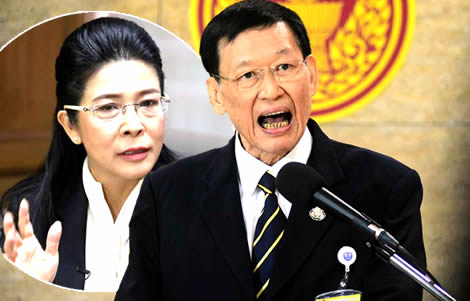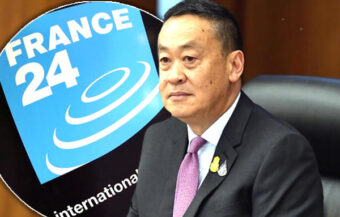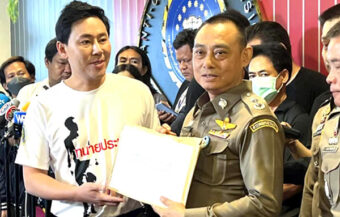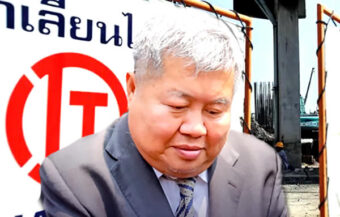Amendment bill faces its third reading vote under Section 256 of the 2017 Constitution but last week, the Constitutional Court handed down a decision saying that while parliament could proceed to rewrite the charter, it must first seek the public’s approval by referendum and at the end of the process, again seek final approval for any resultant provision in order to amend or replace the existing constitution.
Thailand could soon find itself facing a referendum seeking public approval for constitutional change according to one side of an argument developing in parliament and political circles following a key decision of the Constitutional Court last week. Palang Pracharat Party MP Paiboon Nititawan who brought the case to the court, said, this week, that the current process in parliament now lacks legitimacy and a referendum is required to carry forward constitutional reform. Strikingly, it is also the position of former Pheu Thai Party Chief strategist Khunying Sudarat Keyuraphan.

The President of the Thai parliament, Chuan Leekpai, has indicated that a vote on the third reading of a bill or amendment to rewrite the Thai constitution scheduled for Wednesday the 17th March is to go ahead despite a ruling last week from the Constitutional Court which put the whole process in question.
Last week’s ruling was handed down by a majority decision of the court after a petition was submitted by Senator Somchai Swangkarn and Palang Pracharat Party MP, Paiboon Nititawan.
Ruling party MP Paiboon Nititawan says current process underway in parliament is flawed
In recent days, the ruling party MP has said he thinks that the process currently underway has now been undermined by the court’s ruling and is essentially invalid.
‘The public should have been asked in a referendum first whether they wanted the charter amended in its entirety,’ he said.
In its ruling last week, the court examined Section 256 of the 2017 Constitution which in nine separate clauses sets forth a process to alter or amend the constitution.
The court’s ruling has become the source of different interpretations and disagreements on how to proceed.
Parliament President Chuan Leekpai pushes ahead
An advisor to the parliament’s president, Mr Sukit Atthopakorn, has confirmed that the vote will proceed on Wednesday on the third reading as stipulated in Section 256 of the constitution.
A deputy leader of the ruling Palang Pracharat Party and government whip, Mr Wirach Ratanasate, however, has expressed caution.
‘We have to tread carefully,’ he said.
Pheu Thai Party officials and academics agree that the current process must be pursued
The Secretary-general of the Pheu Thai Party, Prasert Jantararuangtong, indicated that his party’s MPs were ready to proceed with the vote.
This course is supported by many academics such as Prinya Thaewanarumitkul of Thammasat University who suggested the way is clear to approve the process in parliament and have the matter then referred to a referendum based on the court’s decision.
This was a similar stance taken to that of Chusak Sirinil, a deputy leader of Pheu Thai.
Former Pheu Thai leader Khunying Sudarat Keyuraphan agrees that a referendum is now required
However, a former member and key leader of the party Khunying Sudarat Keyuraphan, has said that the process in parliament should be abandoned and efforts made to quickly go to the people with a referendum to have a new constitution drawn up under existing legal provisions.
The Constitutional Court, in its decision last Thursday, ruled by a majority that any proposal to write a new constitution must first begin with a referendum allowing the people to decide whether they want to adopt such a course or not.
It accepted that parliament had the power to proceed in such a manner under the existing constitution once approved by the people.
Court accepted that Section 256 can be used in this manner by parliament subject to the public’s approval
The court accepted that Section 256 can be used in such a fashion but also then stipulated, by unanimous vote, that a final referendum must be put to the public to accept any new constitution or provision which would be the result of such a process.
The confusion on the matter stems from whether this is a process to amend and alter the existing constitution or a bill to compose an entirely new supreme law.
Urgency created by student-led street protests
The urgency of the matter has been caused by ongoing street protests as parliament has attempted to find an answer to demands for constitutional change to the current status quo which the protesters and many observers see as biased towards the ruling party and establishment, still seen as linked to the military.
However, it is thought that MPs from the ruling Palang Pracharat Party and other more conservative voices may now oppose the current process underway based on the court’s decision when the vote is taken on Wednesday.
Join the Thai News forum, follow Thai Examiner on Facebook here
Receive all our stories as they come out on Telegram here
Follow Thai Examiner here
Further reading:
Future Forward Party dissolved – leadership banned from politics by Constitutional Court order
Parliament to debate PM’s oath-taking question which is also referred to the Constitutional Court
Thailand seeks less rancour as it counts down to its first election under the new Constitution
Radical new Thai constitution now in the hands of the Thai people who vote in August
Rejection of draft constitution means extended military rule




















